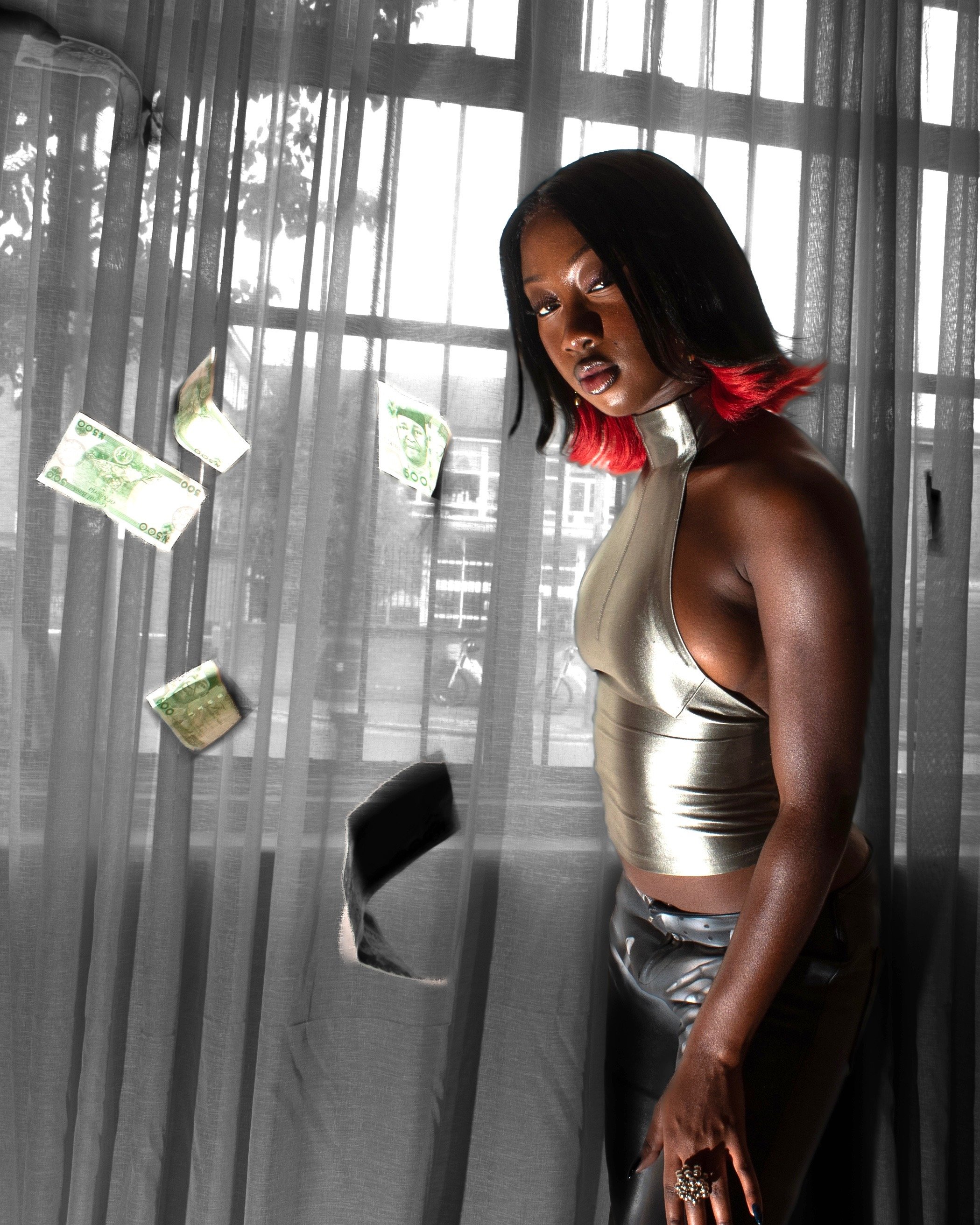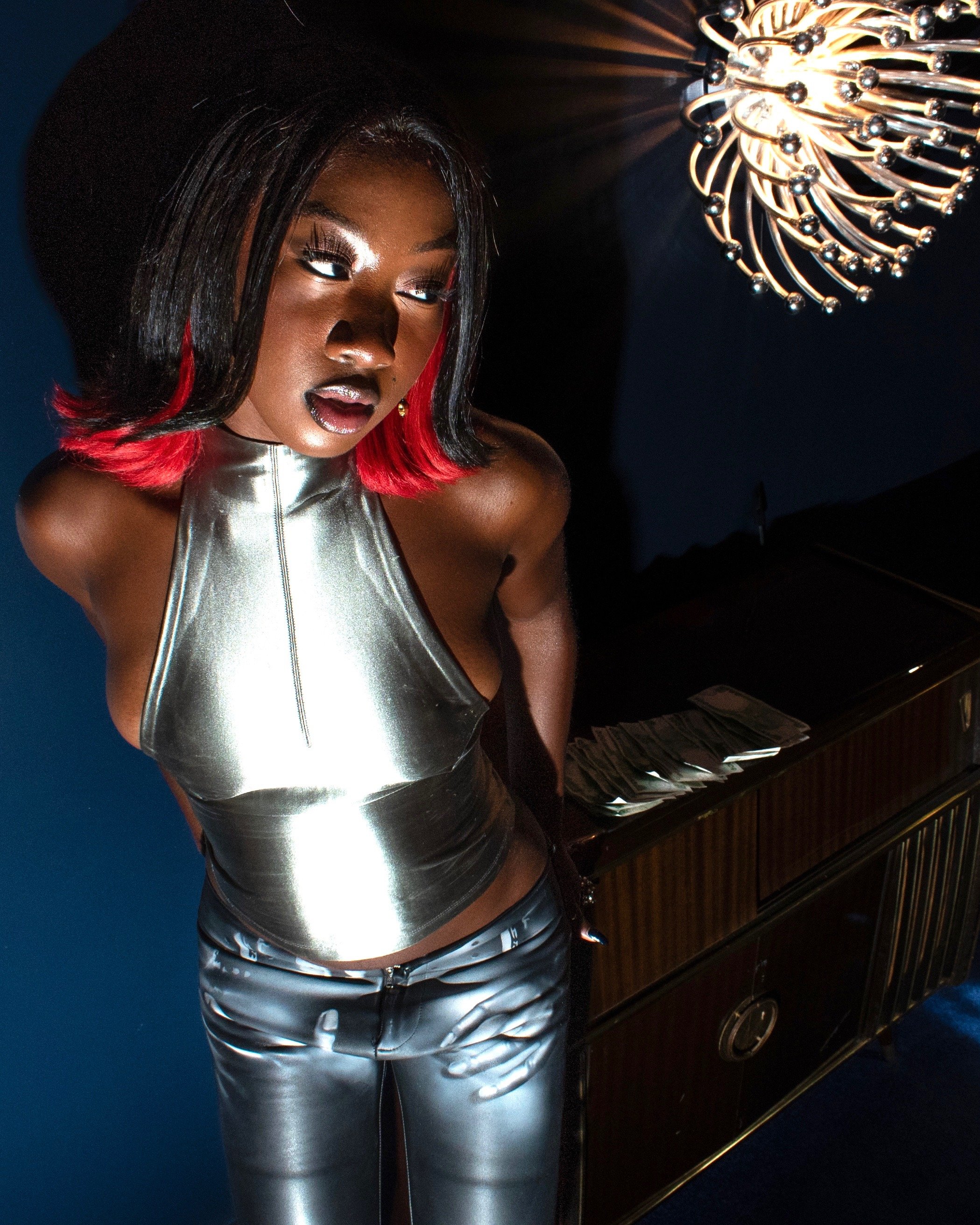“It’s DEELA, Bitch”: British-Nigerian Artist DEELA Is the Alté Voice You Need to Hear
DEELA opens up about the creative process behind her EP.
Photography by Ned Robinson Jones
DEELA is rewriting the rules of alté music, integrating the zealous sounds of her Lagos upbringing with the contemporary edge of UK culture. Her latest EP, Good Girl No Dey Pay, produced by alté producer Genio Bambino, reflects her multi-genre influences—from the nostalgic rhythms of early 2000s Afrobeats to mellow hip-hop grooves and dancefloor-ready energy. Known for her confident delivery and signature phrase, “It’s DEELA, bitch,” the British-Nigerian rapper draws inspiration from her life experiences, infusing her lyrics with a bad-ass personality. Collaborations with Flo Milli, Teni, and Zack Fox, as well as recognition from Baby Keem, Isaiah Rashad, and the Recording Academy, cement her as one of alté’s most exciting new voices.
In this conversation, DEELA opens up about the creative process behind her EP, revealing how a return to Lagos inspired her to switch up her sound and embrace the city’s energy. She discusses her favorite tracks, like “Kryptonite” and “Final Boss,” which embody her ability to merge Afrobeats, hip-hop, and alté influences effortlessly. Beyond music, DEELA shares how fashion and visuals play a vital role in her artistry, taking cues from icons like Rihanna and Aaliyah. With plans to release more singles, and visuals, and expand her reach internationally, DEELA’s rise to global recognition feels inevitable.
This interview has been edited for length and clarity.
So tell me about your latest EP. I love the sensual dance vibe of each song. What goals did you have when approaching this project?
I worked with this one producer. His name is Genio, and he has a very distinct type of drum pattern that he uses on his beats. So, going forward, I was trying to make something that was in a different space compared to the other stuff that I have because I feel like when I started making music, it was almost not duplicated to what I listen to. I listen to a lot of Young Nudy, Young Thug-type of music. I gravitate towards that sort of beat, those hip-hop-type beats. When I was coming back to Lagos, I was like, ‘It needs to be a different sort of production to kind of catch their energy.’ Rap is not a huge genre that people listen to in Nigeria. I was thinking of how I could switch it up. That's how I came into the whole Good Girls No Dey Pay EP.
With your music, I love how I can hear different elements from various genres of Afrobeats, hip-hop, and R&B. Which track on the EP do you feel best embodies the multi-genre influence?
I would say ‘Kryptonite’ because it's very dance-like, but then, at the same time, still very mellow. I don't know how to explain it. It just sits in different pockets. And ‘Final Boss’ as well because that's like hip-hop, but then the drums are very Afrobeats. It’s more like alté. That’s what they call it in Nigeria—alternative music—but they call it alté. Like Odunsi and Santi, that’s where you’ll hear it sometimes. That's kind of where it comes from.
With this project and your songwriting in general, is there anything in particular that helps you channel your inner baddie while writing your lyrics?
Thinking about what's happening in my life: That's what fuels it. People are so funny. People are so fascinating. People drive a lot of what I write about and how I feel. And people seem to relate to it.
I know you’re a Lagos-born artist, but you also moved to the UK. How did the culture and music of each place influence your style?
I’ve been traveling since I was young with my family, and they also play a wide variety of music. From the beginning, obviously, Afrobeats was very big in Nigeria, but Afrobeats now, with what you hear of Wizkid and Burna Boy, isn't the same. When I was growing up, it was a different type of sound. That’s the best way I can explain it. A lot of the songs on Good Girls No Dey Pay are actually inspired by nostalgic or old Afrobeat songs. And I’ve been listening to different types of music as I grew up. Like my dad would put on Jay-Z and a blend of stuff. I was exposed to it early on.
I love how your outfits and the style of your cover art play into your visuals. Who are some of your fashion inspirations?
I love Bree Runway. She has the most amazing archives. Also, Leomie Anderson—those are the British girls when it comes to dressing—and obviously Rihanna. She's an icon. She changes her style with every album she drops, which I thought was really cool. But it was still very much authentic to her. It never seemed like it was a gimmick. And Aaliyah because she has that tomboy-like style as well, but in her own way. I like grunge things like spikes, leathers, blacks, and dark looks, but with a spin that doesn't make it too dark.
I also have to ask: I see both you and Zack Fox together on my TikTok For You page a lot. I know you supported him on his Europe tour, but how did that friendship come about?
It was so random. His team literally just sent me an email like, ‘Zack is a huge fan of your music, and he’d like you to open for his tour.’ I had to check if the email was fake because there are so many scams nowadays. I was like, if it’s a joke, it's a sick joke. Anyway, I found out that it was real and it was actually his manager. They initially asked me to open for him in London, and they also said, ‘Oh, he’d love for you to come out to Amsterdam as well.’ They paid for my plane ticket as well. I was like, ‘Wow, okay, I’ll be there.’ He's really cool in person. We kept the connection. He’s very tapped in. He’s a very funny guy.
Photography by Ned Robinson Jones
I’m a big fan of your song ‘Take It Up’ and was so happy to see the remix with Flo Milli. Tell me the story of how she got on the remix.
Thank you. That was also a very ‘What the fuck?’ moment. The song was just moving on TikTok. It somehow got to her, and she commented that it was tough. I was like, ‘Oh my gosh, crazy.’ I took it to Instagram, and I tagged her. She replied to that as well, and she was like, ‘You did your thing.’ I was like, ‘Remix?’ as a joke, and I wasn’t being for real. And she did it. She sent her verse a week later. I think she was doing Coachella at that time, so she was like, ‘When I’m done with this, I’m gonna send it to you.’ And she did. It was so easy. She could have easily bailed and pretended like nothing happened, but she actually followed through. It's crazy.
Yeah, that is really crazy, especially with her too. Her music is just so amazing.
Exactly. I’ve been following her since ‘Beef FloMix,’ so it was a very surreal moment for me.
Speaking of collaborations, who’s been on your playlist lately? Are there any artists you would like to collaborate with?
I’ve been listening to SahBabii a lot. He was my top artist this year on Spotify. His voice is so unique—like how he sounds like he's singing, but he's rapping. I don’t know how he does it. I’ve been listening to a lot of Doechii and Young Thug and alternative R&B like Ojerime and Kelela. I’ll just be in different pockets, really. I try to expand. I do like listening to the same songs that I'm obsessed with, but after some time, it does feel very repetitive.
As you reflect on this past year, what are some things you’re proud of, and what’s also in store for the next?
Well, one of them hasn't come out yet, but I was just chosen for Artists to Watch 2025 for a really well-known publication, so I’m really happy about that. Also, performing at two festivals because there were 10,000 people there, so it was kind of daunting, but it was also really fun. It’s just been a mix of things. I was also on the Grammys’ website for African rappers to listen to. And Baby Keem giving me a cosign was kind of crazy as well. Coming next, I think a load of singles throughout the year with visuals and to be more international because I really like New York. I went there this summer, and I want to come back next year 100%.


